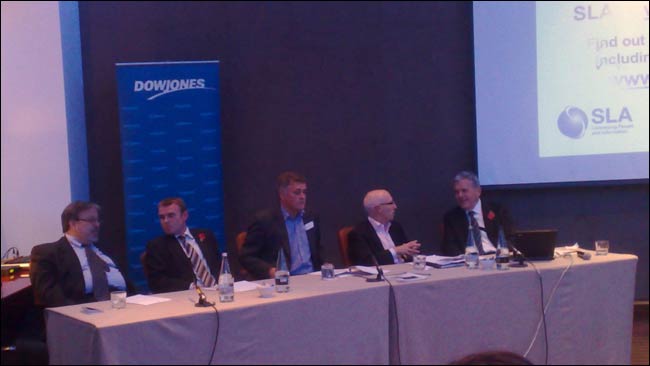"Free vs Fee – the Future of News": Notes and take-away quotes - Part 2
I blogged last week some points I'd taken away from an SLA Europe meeting entitled "Free vs Fee – the Future of News". The event comprised of some short presentations and then a Q&A session with Andrew Hughes of the NLA, Acquire Media's Laurence C. Rafsky, Jeremy Lawson from Dow Jones, and new media lawyer Laurence Kaye. Today I wanted to post some more of my take-away notes from the event.

A fractured industry approach to the future
Andrew Hughes of the NLA produced an interesting statistic: "31.5% of online newspaper content hasn't appeared in print, and 38% of print content never makes it onto the website". He also had to admit that the FT and News International are not on board with the current NLA plans for a web end user licence for commercial re-use of newspaper content.
I think that says something about the fractured nature of our industry-wide analysis of how we pay for content production in the journalism process. There is a wide range of difference between introducing a 24 hour paywall, (or trying to resurrect 18th century economic models as Kevin Anderson put it), and the Open Platform approach of spreading content far and wide but looking to enter some sort of revenue sharing deals where re-use is commercially successful.
I sometimes joke that between News International and Guardian News & Media, one of us must be wrong. In truth, in the future I think we will see a diversification of financial models supporting journalism, rather than the one-size-nearly-fits-all approach of the last century.
Mind your terms and conditions
Malcolm Coles did a great job earlier in the year of exposing the absurdities of some of the legal T&Cs that were being displayed by UK newspaper websites - including banning linking.
As part of his very entertaining contribution to the SLA Europe evening, Laurence Rafsky did an entire section based on exposing the counter-intuitive nature of restrictive T&Cs. He was talking about news site 'x', whose legal terms and conditions expressly forbade showing representations of their website in public. So he illustrated the entire section of the talk with giant screenshots of rival publication 'y', which happened to be CNET. At the end of the section, he asked the audience which news site they were most likely to remember...
When will print disappear?
One of the questions from the floor was asking the panel to put a date on 'the end of print'. Laurence C. Rafsky said 2030, but he pointed out that the electric light-bulb did not end the production of candles, they just became luxury and souvenir items. He predicted that special limited print runs for big events would continue.
Mind you, he also predicted a future where you would be able to smell the news over the Internet, which sounded like a ghastly concept, so make of his futurology what you will!
Jeremy Lawson saw print having a longer future than that, but not much longer. He also anticipated evolution rather than revolution, pointing out that plenty of 'newswire' services still exist, although they are no longer based on the telegraph technology that originally powered them. Which reminds us that one of the most successful online newspapers in the UK is named after an outdated bit of communications kit.
More...
Elsewhere on the web, Katy Stoddard has put a comprehensive set of notes from the evening online, the Uncooked Data blog also has a post, and Penny Crossland's excellent write-up on VIP LiveWire has sparked some discussion.
Read more of my articles about notes and quotes from media and web events and the future of news
It's sad to see the decline of printed news but its going to happen soon. More and more newspaper companies continue to fall and even the big companies like the NY Times are shaken. Its nice to see that at least they are discussing how to plan out their future.
It's amazing to think how quickly things have changed, and so drastically. For half of their lives my grandparents never had TV's, and for half of my parents' lives they never had the internet. I am 22 and I don't remember a world WITHOUT the internet, wikipedia, google, and television.
Before the internet people relied absolutely on the TV news and on newspapers for their news. Whatever news was deemed unimportant was simply not reported, and with no internet my parents had no way of finding out any of this 'unreported' news themselves. I am able to read a lot of blogs which update me with news from around the world - news that never quite reaches my little TV in New Zealand.